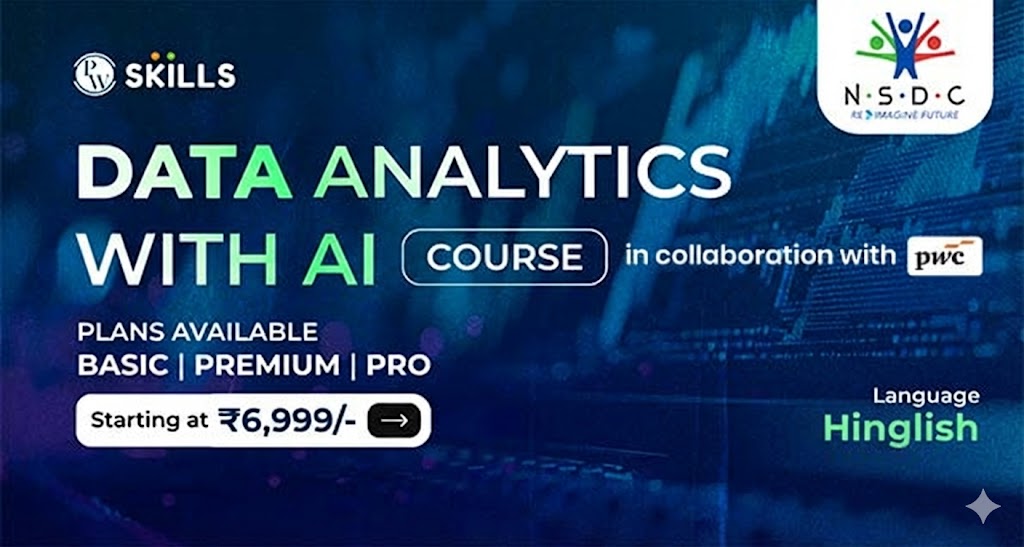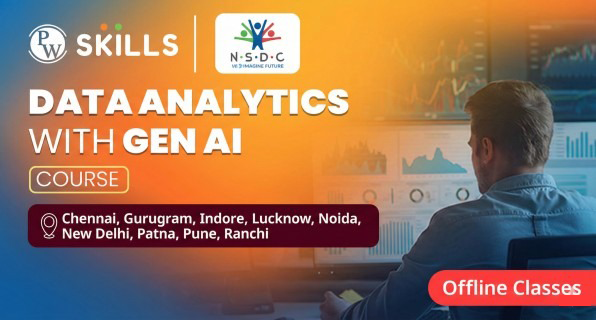AI and Data Analytics: In today’s rapidly evolving digital landscape, data analytics has emerged as a cornerstone for businesses aiming to gain actionable insights and drive informed decision-making. As organisations grapple with vast amounts of data generated daily, the integration of artificial intelligence (AI) into data analytics processes has become imperative. In this blog, we’ll discuss AI and data analytics, its tools, applications, significance, future prospects, and more!
If you’re looking to make a career in AI and data analytics, the PhysicsWallah’s Data Analytics course is just what you need! With our course, you’ll be equipped with all the skills and knowledge needed to succeed as a data analyst. So, don’t wait! Use the coupon code “READER” and get an exclusive discount on all courses from PW Skills!
What is AI Data Analytics?
AI data analytics refers to the amalgamation of artificial intelligence technologies with traditional data analytics methodologies to extract meaningful insights from complex datasets.
Unlike conventional data analytics, which relies on predefined algorithms and manual intervention, AI data analytics leverages machine learning, deep learning, and other AI techniques to automate and optimize data analysis processes.
This convergence enables organizations to uncover hidden patterns, predict future trends, and make data-driven decisions with unparalleled accuracy and efficiency.
AI Data Analytics Tools
The market is replete with advanced AI and data analytics tools designed to simplify complex data analysis tasks.
Tableau
Overview
Tableau is a leading data visualisation and business intelligence tool that empowers organisations to transform raw data into insightful visualisations, dashboards, and interactive reports.
Key Features
- Intuitive interface and drag-and-drop functionality
- Advanced analytics engine for data exploration
- Integration with AI technologies, such as natural language processing (NLP) and predictive analytics
Benefits
- Facilitates collaboration across various departments and industries
- Enables users to identify trends and uncover hidden patterns effortlessly
- Enhances decision-making and strategic planning capabilities
IBM Watson Analytics
Overview
IBM Watson Analytics is a cloud-based analytics platform designed to simplify complex data analysis tasks and empower organisations to make data-driven decisions with confidence.
Key Features
- Data preparation, predictive modelling, and cognitive analytics capabilities
- Integration with IBM’s ecosystem of cloud services and AI tools
- Advanced features, such as natural language processing (NLP) and predictive analytics
Benefits
- Facilitates collaboration, accelerates decision-making, and drives innovation
- Enables organisations to extract insights, optimise processes, and achieve strategic objectives
- Seamless integration with IBM’s cloud services enhances scalability and value proposition
Google Cloud AI
Overview
Google Cloud AI is a comprehensive suite of AI-powered tools and services designed to enable organisations to build, deploy, and manage machine learning applications at scale.
Key Features
- Machine learning, natural language processing, and computer vision capabilities
- Integration with Google Cloud Platform (GCP) services, such as data storage and processing
- Suite of tools, including Google Cloud AutoML, TensorFlow, and BigQuery ML
Benefits
- Facilitates data analysis, model training, and deployment
- Automates routine tasks, improves accuracy, and accelerates time-to-insight
- Scalable, cost-effective solution for AI-driven data analytics initiatives
Microsoft Power BI
Overview
Microsoft Power BI is a leading business analytics and data visualisation platform that enables organisations to transform data into insightful dashboards, reports, and interactive visualizations.
Key Features
- Intuitive interface, drag-and-drop functionality, and integration with Microsoft’s ecosystem of productivity tools
- AI-driven analytics capabilities, such as machine learning and natural language processing
- Collaboration, acceleration of decision-making, and drive innovation
Benefits
- Empowers users to explore data, identify trends, and uncover insights effortlessly
- Facilitates collaboration across various departments and industries
- Enhances decision-making and strategic planning capabilities
SAS Viya
Overview
SAS Viya is an advanced analytics platform designed to enable organisations to harness the power of AI-driven analytics to solve complex business challenges, optimise processes, and drive innovation.
Key Features
- Automated machine learning (AutoML), predictive modelling, and cognitive analytics capabilities
- Integration with SAS’ ecosystem of analytics solutions, industry-specific applications, and cloud services
- Advanced features, such as data preparation, modelling, visualisation, and deployment
Benefits
- Facilitates collaboration, accelerates decision-making, and drives innovation across various industries
- Enables organisations to leverage AI analytics to achieve strategic objectives
- Enhances capabilities, scalability, and value proposition for organisations seeking to harness the power of AI analytics.
How is AI Used in Data Analytics?
AI is revolutionising data analytics by enhancing its speed, accuracy, and scalability. AI algorithms, such as neural networks and decision trees, analyse vast datasets at unprecedented speeds, identifying patterns and correlations that might be overlooked using traditional methods.
Moreover, AI-driven predictive analytics models forecast future trends, enabling organisations to anticipate market shifts, optimise resource allocation, and capitalise on emerging opportunities. Additionally, AI technologies automate routine data analysis tasks, freeing analysts to focus on strategic initiatives and value-added activities.
Also Read: What does a data analyst do?
Why is AI Analytics Important?
In today’s data-driven economy, the importance of AI analytics cannot be overstated. As organisations navigate an increasingly complex and competitive landscape, leveraging AI capabilities in data analytics is essential for driving innovation, optimising operations, and gaining a competitive edge. Here are some reasons why AI analytics is crucial:
1. Enhanced Decision-Making
AI analytics empowers organisations to make data-driven decisions with unparalleled precision and confidence. By analysing vast amounts of data in real-time, AI algorithms identify patterns, trends, and insights that human analysts may overlook. This enables businesses to anticipate market shifts, customer preferences, and emerging opportunities, enabling proactive decision-making and strategic planning.
2. Predictive Capabilities
One of the most significant advantages of AI analytics is its predictive capabilities. By leveraging machine learning models and advanced algorithms, AI analytics forecast future trends, behaviours, and outcomes with remarkable accuracy. This enables organisations to anticipate market dynamics, mitigate risks, and capitalise on emerging opportunities, fostering sustainable growth and long-term success.
3. Operational Efficiency
AI analytics streamlines data analysis processes, automating routine tasks, and optimising resource allocation. By reducing manual intervention, minimising errors, and accelerating data processing times, AI analytics enhances operational efficiency, enabling organisations to allocate resources more effectively, streamline workflows, and maximise productivity.
4. Personalised Customer Experiences
AI analytics enables organisations to personalise customer experiences by analysing customer behaviour, preferences, and interactions. By leveraging AI algorithms, such as recommendation engines and predictive analytics models, businesses can deliver personalised content, offers, and recommendations to customers, enhancing satisfaction, loyalty, and retention.
5. Competitive Advantage
In today’s competitive marketplace, gaining a competitive advantage is paramount for business success. AI analytics provides organisations with actionable insights, real-time intelligence, and strategic foresight, enabling them to outperform competitors, differentiate their offerings, and capture market share. By leveraging AI capabilities in data analytics, businesses can innovate rapidly, adapt to changing market conditions, and maintain a competitive edge in their industry.
6. Scalability and Flexibility
AI analytics offers organisations unparalleled scalability and flexibility, enabling them to analyse vast amounts of data, adapt to evolving business requirements, and accommodate growth. By leveraging cloud computing, distributed computing, and scalable AI technologies, businesses can expand their analytics capabilities, handle increasing data volumes, and support business growth without compromising performance or efficiency.
Difference Between AI and Data Analytics
The realms of artificial intelligence (AI) and data analytics, though interconnected, serve distinct purposes and utilise different methodologies to derive insights from data. Understanding the nuances between AI and data analytics is crucial for organisations seeking to leverage these technologies effectively. Here’s a comprehensive exploration of the key differences between AI and data analytics:
Scope and Objectives
- Data Analytics: Data analytics primarily focuses on examining historical data to identify trends, patterns, and correlations that provide insights into past performance and inform present decision-making. It involves descriptive analytics, diagnostic analytics, and prescriptive analytics to analyse structured and unstructured data, generate reports, and facilitate data-driven decision-making processes.
- AI: In contrast, AI extends beyond traditional data analytics by simulating human intelligence, learning from data, making decisions, and performing tasks autonomously without explicit programming. AI encompasses various technologies, including machine learning, deep learning, natural language processing (NLP), and robotics, to emulate human cognitive functions, solve complex problems, and optimise processes across diverse domains.
Methodologies and Techniques
- Data Analytics: Data analytics employs statistical analysis, data mining, data visualisation, and predictive modelling techniques to analyse datasets, extract insights, and generate reports. Analysts use structured query language (SQL), statistical software, and visualisation tools like Tableau and Power BI to transform raw data into actionable insights, support decision-making, and drive organisational growth.
- AI: AI utilises machine learning algorithms, neural networks, deep learning models, reinforcement learning, and other AI techniques to learn from data, identify patterns, make predictions, and automate tasks. AI algorithms adapt and improve over time, enabling systems to perform complex tasks, such as image recognition, speech recognition, natural language understanding, and autonomous decision-making, with increasing accuracy and efficiency.
Applications and Use Cases
- Data Analytics: Data analytics finds applications across various industries and sectors, including marketing, finance, healthcare, retail, and manufacturing, to analyse customer behaviour, optimise operations, improve performance, and drive innovation. Data analysts leverage historical data to generate insights, develop forecasts, evaluate strategies, and support decision-making processes within organisations.
- AI: AI technologies have diverse applications and use cases, ranging from virtual assistants, chatbots, and recommendation systems to autonomous vehicles, predictive maintenance, fraud detection, and healthcare diagnostics. AI systems analyse data, learn from patterns, predict outcomes, automate tasks, and optimise processes across industries, enabling organisations to enhance customer experiences, improve operational efficiency, and drive innovation in today’s digital economy.
Automation and Intelligence
- Data Analytics: Data analytics focuses on analysing historical data, generating reports, and facilitating data-driven decision-making processes within organisations. While data analytics automates routine tasks, optimises processes, and enhances efficiency, it relies on predefined algorithms, manual intervention, and human expertise to analyse data, interpret results, and derive insights.
- AI: AI technologies emulate human intelligence, learn from data, make decisions, and perform tasks autonomously without explicit programming. AI systems adapt and improve over time, enabling organisations to automate complex tasks, optimise processes, and derive deeper insights from data, enhancing decision-making, and driving innovation across diverse domains.
What is the Future of Data Analytics AI?
The future of AI data analytics appears promising, with emerging technologies and innovations poised to reshape the industry landscape. Advancements in AI algorithms, such as reinforcement learning and generative adversarial networks (GANs), will enable organisations to extract deeper insights from unstructured data sources, such as images, videos, and text.
Furthermore, the integration of AI with edge computing, IoT devices, and cloud platforms will facilitate real-time data analysis, enabling organisations to respond swiftly to changing market dynamics and customer preferences.
Additionally, ethical AI frameworks and regulations will govern AI data analytics practices, ensuring transparency, fairness, and accountability in AI-driven decision-making processes.
Also Read: 5 Surprising Facts About Data Analytics
What is the Salary of an AI Data Analyst in India?
In India, AI data analysts command competitive salaries, reflecting the growing demand for skilled professionals in this domain. According to industry reports, AI data analysts in India can expect salaries ranging from INR 6 lakhs to INR 15 lakhs per annum, depending on factors such as experience, skills, location, and employer.
As organisations across various sectors, including IT, healthcare, finance, and e-commerce, continue to invest in AI analytics capabilities, the demand for qualified AI data analysts in India is expected to surge, offering lucrative career opportunities and competitive compensation packages.
AI Data Analytics Jobs
The burgeoning demand for AI data analytics skills has created a plethora of job opportunities across various industries and sectors. Roles such as AI data analyst, machine learning engineer, data scientist, and AI solutions architect are in high demand, requiring professionals to possess expertise in AI algorithms, programming languages, data visualisation tools, and domain-specific knowledge.
As organisations strive to harness the power of AI analytics to drive innovation and competitive advantage, the demand for skilled AI data analytics professionals will continue to grow, offering rewarding career paths, professional development opportunities, and competitive remuneration packages.
Automating Data Analysis Using Artificial Intelligence
AI technologies are revolutionising data analysis by automating routine tasks, enhancing accuracy, and scalability.
AI-driven automation tools and platforms, such as automated machine learning (AutoML) solutions, enable organisations to streamline data preprocessing, feature selection, model training, and evaluation processes, reducing manual intervention and accelerating time-to-insight.
By automating data analysis using artificial intelligence, organisations can improve decision-making, optimise resource allocation, and drive operational efficiency, positioning themselves for sustained growth and success in today’s competitive marketplace.
AI Analytics
AI analytics represents the convergence of artificial intelligence technologies with traditional data analytics methodologies, enabling organisations to derive deeper insights, predictive capabilities, and actionable recommendations from diverse datasets.
By combining AI algorithms, machine learning models, and advanced analytics techniques, AI analytics empowers businesses to uncover hidden patterns, identify correlations, and predict future trends with unparalleled accuracy and efficiency.
As organisations continue to invest in AI analytics capabilities, the adoption of AI-driven decision-making processes will become increasingly prevalent, reshaping industries, driving innovation, and fostering sustainable growth in the global marketplace.
Also Read: 3D Data Visualization Tools, Online and Examples
Which is Better: AI or Data Analyst?
The question of whether AI or data analysts are better suited for specific tasks or roles is not necessarily about one being superior to the other; rather, it’s about understanding their distinct roles, capabilities, and how they complement each other in today’s data-driven landscape.
Data Analysts
Data analysts play a pivotal role in collecting, processing, and analysing data to extract meaningful insights that inform decision-making processes within organisations. Their primary responsibilities include:
- Data Collection and Cleaning: Data analysts are adept at collecting data from various sources, ensuring its accuracy, completeness, and reliability. They employ data cleaning techniques to remove inconsistencies, errors, and duplicates, ensuring data quality and integrity.
- Descriptive Analytics: Data analysts utilise statistical methods, data visualisation tools, and analytical techniques to generate descriptive insights, identify trends, patterns, and correlations within datasets. They create dashboards, reports, and visualisations that facilitate data interpretation and communication.
- Business Insights: Data analysts collaborate with stakeholders across departments to understand business objectives, requirements, and challenges. They translate complex data into actionable insights, recommendations, and strategic recommendations that drive business growth, innovation, and competitive advantage.
Also Read: Data Analysis AI & Tools, Course, Free, Online
AI Professionals
AI professionals specialise in leveraging artificial intelligence technologies, such as machine learning, deep learning, and natural language processing, to automate data analysis processes, predict future trends, and optimise decision-making within organisations. Their key responsibilities include:
- Advanced Analytics: AI professionals employ advanced algorithms and machine learning models to analyse vast datasets, uncover hidden patterns, and identify complex relationships that might be challenging to detect using traditional data analytics methods. They develop predictive models, recommendation systems, and anomaly detection algorithms that enhance data analysis capabilities and generate actionable insights.
- Automation and Optimization: AI professionals focus on automating routine data analysis tasks, optimising processes, and improving efficiency by leveraging AI technologies. They develop AI-driven tools, platforms, and solutions that streamline data preprocessing, feature selection, model training, and evaluation processes, reducing manual intervention and accelerating time-to-insight.
- Innovation and Integration: AI professionals drive innovation by exploring emerging technologies, advancements in AI algorithms, and integrating AI capabilities into existing data analytics frameworks. They collaborate with data analysts, business stakeholders, and IT teams to develop AI-driven solutions, applications, and initiatives that address business challenges, capitalise on emerging opportunities, and foster growth in today’s competitive marketplace.
Also Read: Advanced Analytics: Types, Tools, Examples, Courses, Jobs, Salary
AI data analytics is transforming the future of data-driven decision-making, offering organisations unprecedented capabilities to extract insights, optimise processes, and drive innovation in today’s digital economy.
By leveraging AI technologies, organisations can automate data analysis, enhance accuracy, and scalability, and derive actionable insights from complex datasets, enabling informed decision-making and strategic planning.
AI and Data Analytics FAQs
Will AI replace data analysts?
AI may automate certain aspects of data analysis, but skilled human analysts will still play a crucial role in interpreting results and making strategic decisions.
Which AI branch is best?
The "best" AI branch depends on individual interests and career goals. Machine learning, natural language processing, and computer vision are popular choices with diverse applications.
Who earns more AI or data science?
Salaries in AI and data science can vary, but both fields offer lucrative opportunities. The earning potential depends on factors like experience, skills, and industry demand.
Which is easier, AI or data analytics?
The difficulty of AI versus data analytics depends on individual aptitude and preferences. AI involves more complex algorithms and programming, while data analytics focuses on interpreting and deriving insights from existing data.
Is AI a high-paying job?
Yes, AI roles often command high salaries due to the specialised skills required and the increasing demand for AI expertise across industries.




